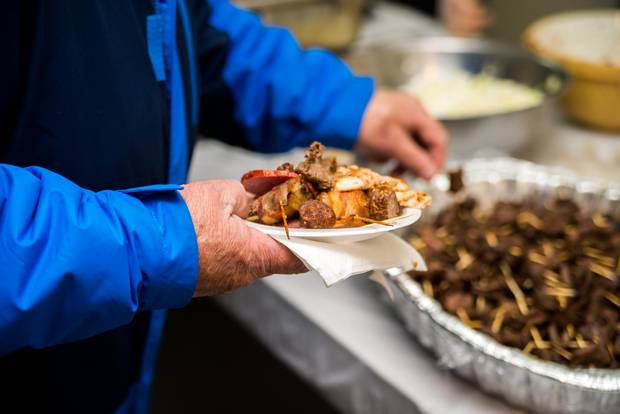Ben Doucette is worried his bear pastrami is too salty.
The 35-year-old cook, who was born and raised in the southwestern Nova Scotia village of Quinan, was given the uncooked, frozen meat a few weeks ago. He cured it in a brine of salt, sugar and pickling spice, and then cooked and cooled it into the sliceable meat, which he's serving on baguette with garlic mayonnaise. Earlier this month, he made 340 moose egg rolls; the year before he slow-roasted caribou with red wine and cranberries. Today, he's responsible for reheating 200 square feet of food in nine square feet of oven space. All this volunteer work and time, he says, is par for the course at the village's annual wild-game dinner. His advice? "Don't be afraid of what you're going to eat."
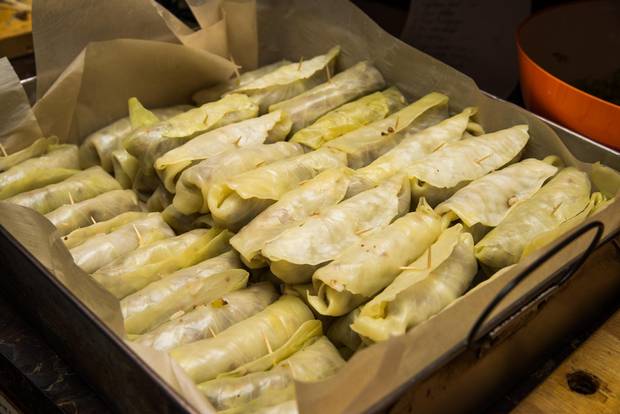
Ben Doucette’s moose meat cabbage rolls, ready for the hundreds of diners who will fill Quinan’s town hall.
Every year, on the first Saturday in March, the town's two-storey hall brims with 300 people – approximately the same number as the village's entire wintertime population – looking to taste wild meats once common to the rural Canadian experience but increasingly exotic to urban palates. Tables brim with chafing dishes of beaver and porcupine, wild goose and bear, muskrat and deer, most of which is prepared at volunteers' homes and served potluck-style. It's against the law to sell wild meat, so anyone here is technically attending a silent auction; the buffet is legally considered an optional perk.
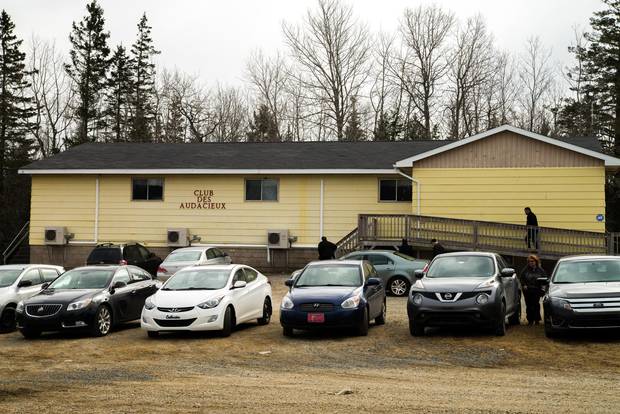
Club des audacieux opened in Quinan in 1977. The town’s annual fundraising auction and potluck dinner started in the mid-2000s to raise money to maintain the deteriorating building and help cover costs.
As legend goes, it was a local schoolteacher who first dreamed of building a community hall for this tiny village, which is a half-hour drive inland from Yarmouth, on the province's western tip. Some said he was crazy, so when it opened in 1977, after three years of construction costing around $60,000, it was as Club des Audacieux, or Club of the Daring Ones. Over the years, it has hosted quilting circles and child care, bingo nights and dances, along with the village's annual Labour Day picnic. As buildings do, it slowly deteriorated, and in 2006, a few locals started a music festival as a fundraiser to help with bills and repairs that ended in debt. Two years later, a group gathered at the hunting cabin of retired high-school teacher George Doucette, Ben's father, and decided to throw a fundraising dinner featuring wild game, a dance and a silent auction to help work off that debt. They've been sold-out ever since. "Honestly, if we didn't have this dinner, the community club probably wouldn't have survived," the younger Doucette says.
Approaching Quinan on winding pavement on March 3 – "the road gets smaller and smaller until you end up in the forest," quips Ben Doucette – we pass low-slung storybook houses and front yards littered with twisted metal and machines: a dented yellow demolition-derby car, a tilted boat, a truck missing its hood. Pulling into the parking lot at noon, the baby-chick-yellow hall is already welcoming a steady flow of volunteers. Two of them, wearing highlighter-yellow T-shirts with the village's bear mascot over their hearts, lug in 50 pounds of potato salad they started making at 8 a.m., along with 10 moose-meat meatloaves and hundreds of meatballs.
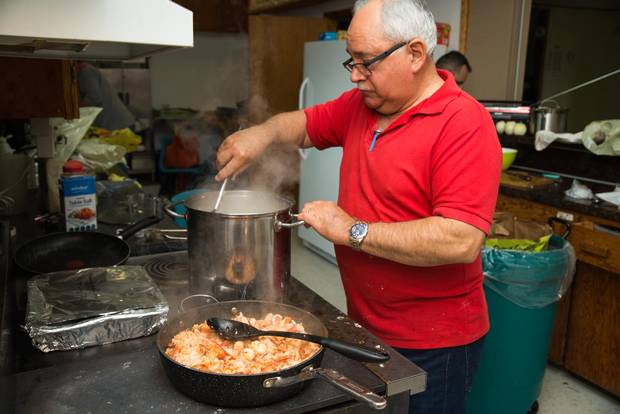
Volunteer George Doucette stirs the chowder.
A bright-blue thermometer peeks out the neck of George Doucette's red-cotton polo: He's in charge of testing each dish to ensure it is hot enough and safe to eat. The doors open at 2:30 p.m. and a crowd, skewing male with ball caps and camouflage gear, heads downstairs. In the cacophonous, low-ceilinged room, they spear appetizers, order drinks at the bar and peruse the silent auction. Items up for grabs include a generator, a quilt, two wills and powers of attorney valued at $650, a giant jug of local maple syrup and a $50 gift certificate to a sex shop.
Traditional music, played on fiddle and guitar, welcomes the first wave of diners into the main hall as they are called upstairs, 50 at a time. With the flourish of a large metal spoon, volunteer and retired high-school teacher Nick Doucette (Doucette is a common name here) serves up row upon row of rappie pies – a potato-based, gummy Acadian casserole also called râpure – rabbit, grouse (locally called partridge), chicken, duck and local quahog clams.
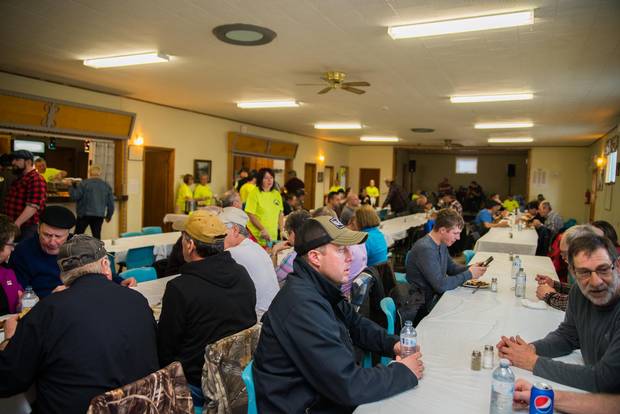
Diners are called up to the buffet 50 at a time, starting at 3:30 p.m.
Even the most persistent buyers often have trouble getting tickets to the dinner every year, says Nick Doucette. "These tickets are like gold," he says. "They go on sale, say, on a Friday night. By Saturday noon they're gone." This year, volunteers and donors snapped up 88 per cent of tickets before they went on sale to the public. "One group this year donated around $500 worth of stuff for the privilege of purchasing four tickets," he adds. (There are no exceptions, even for curious journalists; in order to secure the chance to buy two tickets, this reporter promised, cooked and delivered a giant tray of spicy venison sausage rolls the morning of the event.)
Waiting for food, laughing men and women talk a shifting, lilting blend of French, English and Acadian French, often containing jaunty bits of both. This region is a cultural mix of Acadians and First Nations, British descendants and others, who have long lived here on the providence of land and sea. That diversity is also reflected in the mounded dishes of barbequed deer ribs and pungent muskrat, deeply browned Canada goose meatballs, prehistoric-looking moose bones in giant stewing pots and fluorescent-orange chowder with bobbing whole lobster claws.
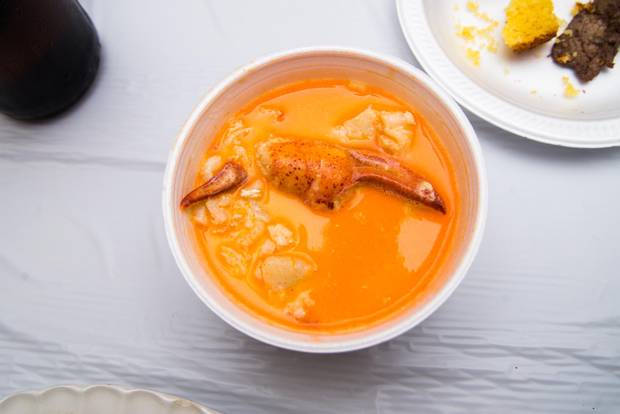
A plump lobster claw peeks out from a bowl of seafood chowder.
Putting on a dinner this size is a big endeavour, but the 50-plus community volunteers make light work, says Ben Doucette, and its importance to the village's identity is hard to overstate. "It's a representation of, I guess, what the community stands for," he says. "Everything we do revolves around food, so for us it's a way to give back and at the same time make delicious food that people will hopefully love."
Because they serve wild game, much of which is donated by hunters from across Atlantic Canada, club president Edmond Dulong says they are under extra pressure to follow food-safety rules closely and keep meticulous records. If a conservation officer comes along they must be able to prove the provenance of each cut of donated meat in their deep freeze. "We need to have the licence number and everything," Dulong says. Food safety is paramount, he says, with servers expected to wear plastic gloves and food closely monitored for how long it has sat at room temperature. Last year's meal made nearly $12,000, which went toward the club's insurance, power bill and maintenance.
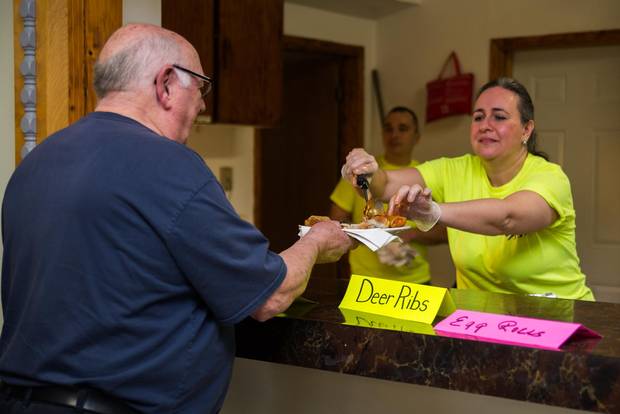
Volunteer Jacqueline Gould serves a moose meat cabbage roll.
As diners fill plates with pasta salad and homemade brown bread, one speckled stewing pot holds honey-garlic porcupine prepared by volunteer Philip Blanchard. He shoots, guts and skins the animals before roasting and shredding them. "Last year, I made rappie pie. That way is much better but some people said they wanted to taste the porcupine more," he says. What does it taste like, I ask? "It tastes exactly like porcupine," he offers, grinning widely. "Enjoy."
